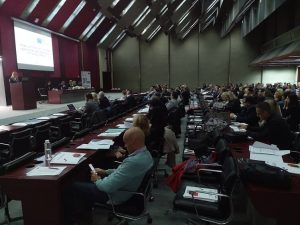NQF AS AN INSTRUMENT FOR TRANSPARENCY AND CONNECTING THE WORLD OF LABOUR AND THE WORLD OF EDUCATION – NATIONAL CONFERENCE WITH INTERNATIONAL PARTICIPATION
Belgrade, December 16th 2019
The National conference with international participation took place in Sava Centre in Belgrade on December 16th 2019, organized in collaboration of the Ministry of Education, Science and Technological Development and the “Development of an Integrated National Qualifications System in Serbia” project, and in partnership with the Qualifications Agency. Various aspects regarding the development and the establishment of national qualifications framework and results achieved were presented, and activities for the oncoming period were announced at the Conference.
In their welcome address, senior officials – Minister of Education, Science and Technological Development, Mr Mladen Šarčević and His Excellency Mr Sem Fabrizi, Ambassador and Head of the EU Delegation, pointed out the importance of national qualifications framework, especially in the context of cooperation between the Republic of Serbia and the European Union that, within the support for education reform in Serbia, also provides support for the establishment of a functional NQF.
The participants were introduced to the achieved results, ongoing activities and further steps planned by the introductory speakers: Professor Gabriela Grujić, Ph.D., Assistant Minister for Dual Education spoke about the challenges of implementing the national qualifications framework; Professor Časlav Mitrovic, Ph.D., Head of the Qualifications Agency presented the competencies, activities and results achieved during the first year of Agency’s operation; Mr Elido Bandelj, Project Team Leader, pointed out that the institutions of the system would be provided support for the development of the NQFS Register, development of the Sectors’ profiles, qualifications’ standards and the recognition of prior learning.
The second part of the conference commenced with a video message from the representative of the European Commission, Mr Koen Nomden, who introduced the participants with the goals and importance of the European Qualifications Framework for Life-long Learning. Experts from Ireland, Mr John O’Connor, Ph.D., Austria, Mr Wolfgang Denk, and Latvia, Ms Sarmita Rutkowska, presented their experiences and highlighted good practices and challenges related to establishing functional national qualifications framework. Experiences of these countries point to numerous advantages: better transparency and possibility to compare and understand diverse national educational systems; shifting the focus to learning outcomes contributing to the quality of educational programmes; involvement of employers and social partners is the key regarding the relevant qualifications meeting the needs of the labour market.
At the beginning of the afternoon session, the participants were presented with the Report on the referencing of the NQFS to the EQF, which was preliminary presented to the members of the European Commission Advisory group in November this year. Tatjana Glišić-Milutinović, one of the authors of this project, pointed out that once the final version of the Report had been adopted, the following activities would be planned and initiated, in accordance with the referencing process.
The final part of the conference was organised as a panel discussion between the representatives of various institutions and bodies in charge of the implementation of national qualifications framework: the Ministry of Labour, Chamber of Commerce, higher education, sector skills councils, Institute for Improvement of Education, shared their views about the NQF. NQF has been established – the next, equally important stage will be the development of all its parts and the required harmonization and alignment of the needs of various institutions within the system. Unlike other frameworks that establish borderlines, the National Qualifications Framework offers opportunities – an access education, mobility, advancement and professional development. Citizens will have the opportunity to see the concrete results of this great and important work as early as next year, said Vesna Fabian, the Head of the Group for Dual Education and National Qualifications Framework at the Ministry of Education, Science and Technological Development in the panel discussion.
More than 200 participants, representatives of the state institutions, boards, sector skills councils, schools, civil society organisations and international organizations, attended the Conference.
The key message of the Conference was that NQF represents an important mechanism for identification, creating and classification of qualifications, which encompasses all the qualifications acquired through various types of education and training and enables their comparison in a simple and transparent way. With its establishment, Serbia took a major step forward towards connecting the world of labour and world of education. However, there are still many challenges to be addressed on the road towards having a completely functional qualifications framework fully referenced to EQF. Still, the results achieved in the last year and the dedication of institutions to the development of NQF allow for optimism regarding the efficient implementation of all activities anticipated in the forthcoming period.
Koen Nomden – video message NQF Conference Belgrade 16 December 2019











